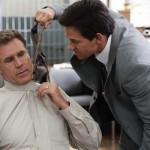Running From Crazy Review
Posted on November 8, 2013 By John Gilpatrick 2013, Documentaries, Movie Reviews, New Releases
Early on in Barbara Kopple‘s latest documentary, Running From Crazy, actress Mariel Hemingway takes the podium to speak at an event promoting suicide prevention. She acknowledges that she’s lost seven family members to suicide including, most famously, her grandfather Ernest. Before she gets to the seventh name, however, she pauses, and Kopple cuts away dramatically. We never return to that moment, but anyone with cursory knowledge of the Hemingway family knows the name Mariel was about to speak—Margaux Hemingway, her sister.
A world-famous model (and an admittedly less famous actress), Margaux took her own life in 1996. This particular tragedy serves as the driving force of Running From Crazy‘s almost narrative approach to the Hemingway family legacy. Perhaps its because Margaux’s suicide was the one that struck closest to home for the film’s star, Mariel. Mariel will repeatedly tell you she and her sister weren’t close—something, again, almost anyone with knowledge of the Hemingways already knows. But the youngest sister of the three (painter Joan or “Muffet” being the oldest) doesn’t shy away from this. She doesn’t shy away from almost anything, which makes Running From Crazy all the more compelling. Its attempts at demonstrating how Mariel is able to do exactly what the title says are limp, but the way it tells Margaux’s story with sometimes heartbreaking commentary from Mariel is great.
Kopple uses a lot of archival footage of Margaux to tell her story, and she starts right at the beginning. The three girls had a rough childhood—sexual abuse by their father is more than hinted at—and Margaux (then Margot) found herself attracted to the bright lights, big city lifestyle. In the 1970s, she signed the largest contract in modeling history to that date, and her raspy voice and bold attitude made her a superstar. When she turned toward acting, however, she was savaged by critics. To make matters worse, she nabbed baby sister a role in what was supposed to be her big break—Lipstick—and Mariel earned raves. Then, of course, came Manhattan and Mariel’s Oscar nomination. Margaux did little of note after that. She married twice, divorced twice, had a number of drug problems, and died alone, tragically.
I eluded to the film’s structure as being almost like that of a narrative feature, and it’s one of the things I most admired about Running From Crazy. When it isn’t delving into the benefits of a new age lifestyle, it’s telling a simple story about a family that falls apart over time. There are a lot of details about the Hemingways that make everyone’s end fates seem appropriately melancholy. The aforementioned sexual abuse, the alcoholism, the rivalries, the suicides, the legacy—it’s too much for most of these people. Even the survivors—Muffy for example—are struggling. The film’s standout scene, arguably, takes place when Mariel visits her noticeably disturbed older sister. It’s a brutal sequence because Muffy so plainly couldn’t cope with the pain. Mariel, meanwhile, has found her happy place, but seeing her sister seems to open old wounds.
If the film cut the fluff, it would be an undeniably great one. I wouldn’t describe the final product that way, but I admired Hemingway’s honesty quite a bit, nonetheless. Running From Crazy is a moving documentary with a beating heart, which makes it worthy of your time when it comes your way.
2013, 3 Stars, Barbara Kopple, Margaux Hemingway, Mariel Hemingway, Running From Crazy
















